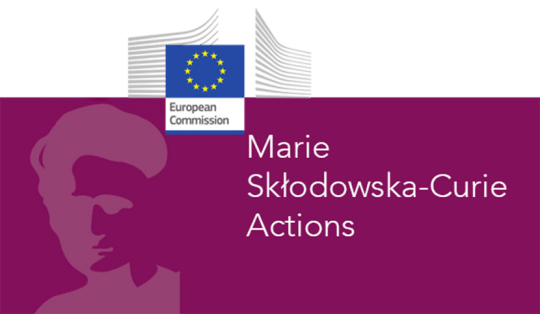Oportunidades de financiamento do Horizonte Europa no programa Marie Skłodowska-Curie
(Apenas disponível em Inglês)
Marie Skłodowska-Curie Action (MSCA) is a set of major research fellowships created by the European Union/European Commission to support research in the European Research Area (ERA). The MSCAs are among Europe’s most competitive and prestigious research and innovation fellowships.
MSCA programme is part of the HORIZON EUROPE pillar one and it is designed to promote interdisciplinary research and international collaborations, supporting scientists from not only within Europe but also across the globe.
A variety of fellowships are awarded by the European Commission across scientific disciplines within the framework of Horizon Europe and are grouped into the following schemes:

Doctoral Networks (DNs):
The next call for applications will be open on 30 May 2023.
Objective: is to implement doctoral programmes by partnerships of organisations from different sectors across Europe and beyond to train highly skilled doctoral candidates, stimulate their creativity, enhance their innovation capacities and boost their long-term employability.
Type of Doctoral Networks:
- Standard Doctorates – focus on the implementation of doctoral programmes in specific and inter-disciplinary scientific fields in academia and/or industry.
- Industrial Doctorates – specifically designed to train PhD candidates who wish to develop their skills and step outside academia, in particular in industry and business.
- Joint Doctorates – provide a highly integrated type of international, inter-sectoral and interdisciplinary collaboration in doctoral training leading to a joint doctoral degree or multiple doctoral degrees awarded by the participating institutions.
Doctoral Networks are open to international consortia of universities, research institutions, businesses, SMEs and other non-academic organisations. Furthermore, DNs are also open to the participation of organisations from third countries, in view of fostering strategic international partnerships for the training and exchange of researchers.
Postdoctoral Fellowships (PFs):
The next call for applications will be open on 12 April 2023.
Objective: to support researchers’ careers and foster excellence in research. The Postdoctoral Fellowships action targets researchers holding a PhD who wish to carry out their research activities abroad, acquire new skills and develop their careers. PFs help researchers gain experience in other countries, disciplines and non-academic sectors.
Type of Postdoctoral Fellowships:
- European Postdoctoral Fellowships – are open to researchers moving within Europe or coming to Europe from another part of the world to pursue their research career. These fellowships take place in an EU Member State or Horizon Europe Associated Country and can last between 12 to 24 months (additional 6 months in the non-academic sector). Researchers of any nationality can apply.
- Global Postdoctoral Fellowships – fund the mobility of researchers outside Europe. The fellowship lasts between 24 to 36 months, of which the first 12 to 24 months will be spent in a non-associated Third Country, followed by a mandatory return phase of 12 months to an organisation based in an EU Member State or Horizon Europe Associated Country. Additional 6 months in the non-academic sector are also possible. Only nationals or long-term residents of the EU Member States or Horizon Europe Associated Countries can apply.
Both types of fellowships may also include short-term secondments anywhere in the world during the fellowship (except during the return phase of a Global Fellowship).
Interested researchers submit an application together with a host organisation, which can be a university, research institution, business, SME or other organisation based in an EU Member State or Horizon Europe Associated Country.
Interested researchers should have a PhD degree at the time of the deadline for applications and must have a maximum of eight years of experience in research, from the date of the award of their PhD degree.
Staff Exchanges:
Deadline: 8 March 2023
Objective: funds short-term international and inter-sectoral exchanges of staff members involved in research and innovation activities of participating organisations. The aim is to develop sustainable collaborative projects between different organisations from the academic and non-academic sectors based in Europe and beyond.
Staff Exchanges are open to international consortia of universities, research institutions, businesses, SMEs and other non-academic organisations.
The grant funds the mobility of seconded staff members from one month to one year. Researchers can be at any career stage, from PhD candidates to postdoctoral researchers, as well as administrative, technical or managerial staff involved in research and innovation activities. Researchers can be of any nationality.
COFUND:
Deadline: 9 February 2023
Objective: provides funding for regional, national and international programmes for training and career development, through co-funding mechanisms. COFUND promotes sustainable training and international, interdisciplinary and inter-sectoral mobility.
Type of COFUNDs:
- Doctoral Programmes – offer research training activities to allow doctoral candidates to develop and broaden their skills and competences. They will lead to the award of a doctoral degree.
- Postdoctoral Programmes – offer individual advanced research training and career development fellowships for postdoctoral researchers.
A single legal entity in an EU Member State or a Horizon Europe Associated Country applies. Additional partners can be included in the project.
MSCA and Citizens:
The next call for applications will be open on 20 June 2023.
Objective: to bring research and researchers closer to the general public at large and increase public awareness of R&I activities. It does so through the organisation of the European Researchers’ Night, a research communication and promotion event taking place across EU Member States and Horizon Europe Associated Countries.
The European Researchers’ Night can be organised either by one single beneficiary or by several organisations constituting a partnership at regional, national or international level.
MSCA info